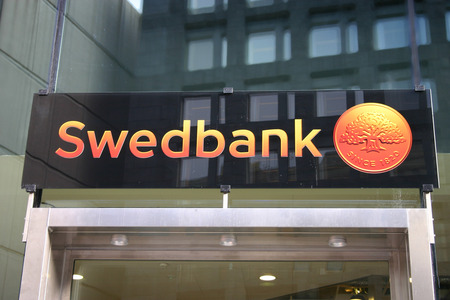Swedbank gets Nordic tight with Eu1bn, Aktia mandates
Mar 6th, 2015
Swedbank quickly followed up AT1 and senior unsecured deals with a Eu1bn seven year covered bond on Wednesday, the tightest post-crisis Nordic euro benchmark, and the issuer’s funding head said the prevailing low funding costs mean there is little incentive to hold off.
 The deal is only the second euro benchmark from the Nordics this year, after a Eu1bn long five year from Danske Bank on Wednesday of last week (25 February), and the first Swedish euro benchmark since November, when Stadshypotek price a Eu1.25bn seven year at 2bp through mid-swaps.
The deal is only the second euro benchmark from the Nordics this year, after a Eu1bn long five year from Danske Bank on Wednesday of last week (25 February), and the first Swedish euro benchmark since November, when Stadshypotek price a Eu1.25bn seven year at 2bp through mid-swaps.
Further Nordic supply is in the pipeline, with Aktia Bank having scheduled a roadshow to start on 16 March ahead of a euro benchmark covered bond, subject to market conditions. Crédit Agricole CIB, JP Morgan, LBBW and Natixis have the mandate. Aktia’s last euro benchmark was a Eu500m five year priced at 8bp over mid-swaps in April 2014.
“The covered bond market is going from strength to strength for the Nordics,” said Robert Chambers, FIG syndicate manager at Crédit Agricole. “That can be seen clearly in the transactions that have come in the last couple of weeks and which are paving the way for Aktia to access the market.”
Swedbank’s issue came on the same day that HSBC SFH issued a Eu1bn seven year deal and after NordLB CFB and Caja Rural de Navarra sold benchmarks on Monday and Tuesday, respectively, and ahead of the announcement of final details of the European Central Bank’s expanded asset purchase programme.
“We had a transaction in our funding plan for the first two quarters, and we decided yesterday (Tuesday) to go today,” said Ulf Jakobsson, head of funding and liquidity at Swedbank. “We discussed internally if we should go before or after ECB and decided that we wanted to have this done and dusted before the ECB.
“If we would have decided to wait until after the ECB then mid-next week would have been the option.”
Swedbank Hypotek (Mortgage) achieved a re-offer spread of 5bp through mid-swaps on the back of a book of over Eu2.5bn for the Eu1bn (Skr9.25bn) deal. Leads BNP Paribas, Danske, LBBW, Swedbank and UBS had gone out with initial price thoughts of the flat to mid-swaps area, then set guidance at the 3bp through area after taking Eu1.7bn of indications of interest. Bankers at and away from the leads put the new issue premium at 1bp-2bp.
“We are very happy with the outcome of the transaction,” said Jakobsson. “We are not surprised. I thought we would be able to reach this level, but it was great to have that confirmed.”
Despite coming at an historically tight level, the seven year euro issue nevertheless still came around 5bp wider than where a theoretical domestic krona issue would come (with five years being the longest outstanding in krona), according to Jakobsson. However, he said that this was not a significant consideration.
“The euro market give us an opportunity to lengthen the duration of our outstanding covered bond stock, in addition to the investor diversification, and is strategically important for us,” he said, “so the premium to the domestic market is something that we are willing to pay.”
Germany and Austria were allocated 60%, the Nordics 17%, the UK and Ireland 9%, the Benelux 4%, Switzerland 4%, other 6%. Banks took 58%, central banks and official institutions 15%, funds 13%, insurance companies and pension funds 11%, and others 3%.
The benchmark comes after Swedbank sold a $750m (Skr6.23bn, Eu674m) inaugural Additional Tier 1 (AT1) deal on 12 February and a $1.4bn dual tranche senior unsecured transaction on Wednesday of last week.
“It’s nice to have these ticked off,” said Jakobsson. “The difference today compared to a couple of years ago — especially if one looks at senior, but also covered — is that when spreads were three, four, five times as wide, it was more expensive to prefund future funding needs. That is less of a consideration today and therefore we can be more opportunistic if we feel that market conditions are right.
“Our funding plan for this year is not that different from the last two or three years,” he added, “and a US dollar covered together with a euro senior are transactions we would like to do during the remainder of 2015.”








